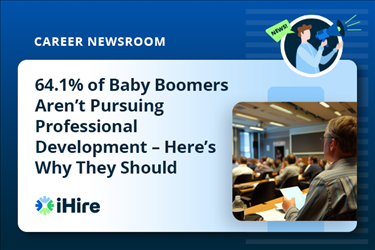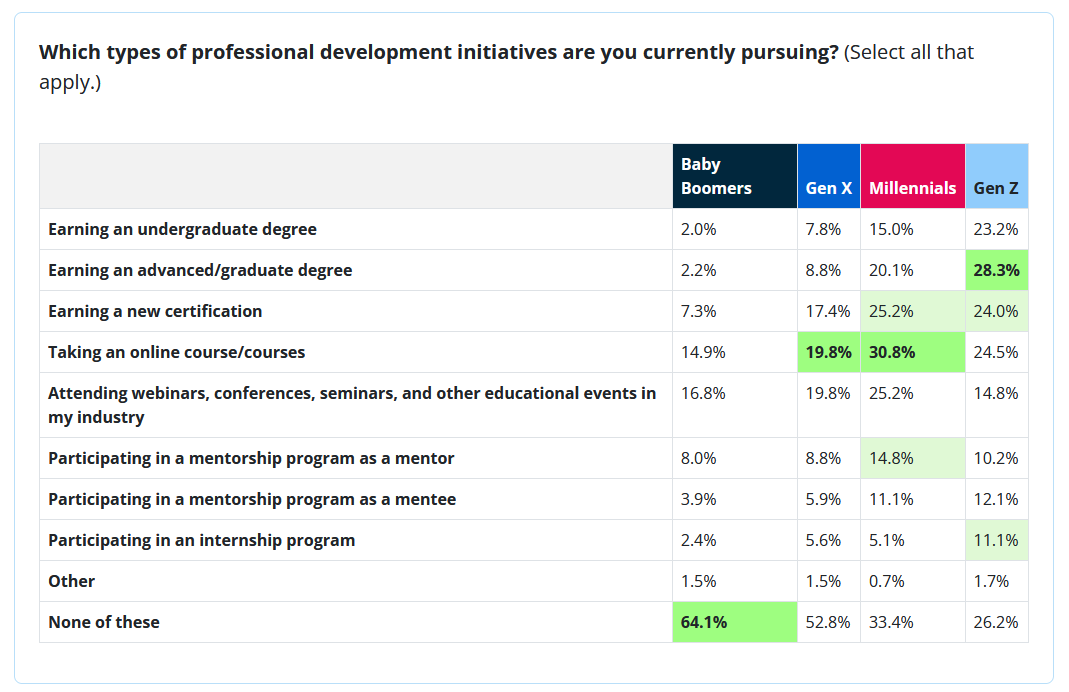- Job Seeker Resources
- |
- Last Updated: June 27, 2025

64.1% of Baby Boomers Aren’t Pursuing Professional Development – Here’s Why They Should
As workplace dynamics continue to evolve, skills gaps grow wider, and talent shortages persist, professional development has become crucial to keeping workers and their employers competitive. However, research suggests that one segment of the workforce is lagging in their interest in professional development: baby boomers.
According to iHire’s 2025 Inside the Multi-Generational Workforce Report, 64.1% of baby boomers are not actively pursuing any professional development opportunities. For those who are engaging in such initiatives, attending webinars, conferences, seminars, and other educational events in their industry (16.8%) and taking online courses (14.9%) are the most popular avenues. Yet, participation rates are still much lower compared to workers from other generations:

Why Aren’t Baby Boomers Pursuing Professional Development?
With retirement on the horizon for many, it’s easy to see why a lack of interest in upskilling, reskilling, and other types of training are on boomers’ backburners. Baby boomers are in the later stages of their careers, and may question the value of investing time, energy, and money into training they might not fully leverage.
Plus, after decades in the workforce, boomers often feel they’ve “seen it all,” with their depth of knowledge and experience. Pursuing professional development opportunities may seem redundant or unnecessary given their expertise.
Another reasons baby boomers may forego professional development is the perception that such programs cater to early- and mid-career professionals. Moreover, digital learning platforms and online training may be daunting to baby boomers who are reluctant to embrace new technologies.
Why Should Baby Boomers Embrace Professional Development?
If you’re a baby boomer brushing off ongoing learning and professional development, consider the fact that retirement ages are shifting. While you may have your sights set on retiring, you could find yourself staying in the workforce longer than expected (or even “un-retiring”) due to financial reasons, personal fulfillment, or labor shortages. In fact, nearly 60% of boomers are delaying retirement due to financial stress.
If your retirement age is potentially a moving target, pursuing professional development opportunities can help support your continued employment. Upskilling or reskilling yourself will keep you relevant and enhance job security, especially during a time when technology like AI is disrupting nearly every industry. It can also augment your resume, giving you a leg up if you end up in a situation where you must search for a new job.
Furthermore, you may pursue part-time or “second act” careers – such as consulting, teaching, or freelancing – in your later years, for which you’ll benefit from additional credentials and in-demand skills.
Lastly, professional development can boost your cognitive ability, emotional well-being, and job satisfaction by allowing you to apply your learnings in meaningful ways.
Your Next Career Move Starts With iHire
Access professional development and training resources and more

Job Seeker Sign In
We Value Your Privacy
Types of Professional Development for Baby Boomers in the Workforce
Professional development can involve a wide range of learning avenues – you don’t have to go back to school or earn an advanced degree to expand your knowledge and boost your marketability. And, your efforts can focus on both hard skills (like learning how to use a specific AI platform) and soft skills (such as communication or leadership), creating a breadth of options for training for baby boomers.
Here are a few examples of professional development that are especially appealing for baby boomers in the workforce.
- Lifelong Learning via Online Courses: Professional development for older workers doesn’t have to be expensive or time-consuming. Online learning platforms offer thousands of courses on topics like AI, digital marketing, finance, wellness, or leadership – all at your own pace. Not sure where to start? Check out iHire’s extensive online course library.
- Networking & Knowledge Sharing: Attending industry events, joining professional associations, or even participating in book clubs can offer informal yet impactful professional development. These environments help boomers stay current, connected, and inspired. Consider attending a virtual conference, joining a local chapter of your industry association, or starting a peer learning group.
- Industry Certifications: Earning (or renewing) professional certifications is a powerful way to validate expertise, stay current with industry standards, strengthen your resume, and enhance employability. For example, a human resources professional might pursue a SHRM certification, while a project manager could earn a PMP credential.
- Mentorship & Reverse Mentoring: Just 8.0% of baby boomers in iHire’s survey are participating in a mentorship program as a mentor, and 3.9% as a mentee. For baby boomers, mentoring others in your company or community is a rewarding way to share your knowledge with less experienced workers. However, participating as a mentee is also beneficial, giving you a chance to learn from and connect with younger colleagues with new perspectives and skills.
Be sure to check with your employer before embarking on a professional development initiative – they may provide you with a stipend, reimburse you, or allot you extra paid time off to pursue it. Additionally, your company may be able to recommend a program or platform that would be of particular interest to you and relevant to your role.
Professional Development: A Smart Move for Baby Boomers
Professional development isn’t just for up-and-coming professionals. For baby boomers, it’s a chance to stay competitive, fulfilled, and ready for the future, no matter your career stage. Whether you’re aiming to sharpen your skills or prepare for what’s next, investing in yourself is always worth it.
Check out iHire’s Resource Center for more career advice for baby boomers and browse iHire’s suite of education solutions to start upskilling or reskilling yourself to meet your goals.

Originally Published: June 27, 2025
Sign In or Register to access all articles and insider tips for help in your job search.
Search for Customer Service Jobs
RELATED JOBS
Company:Auto Glass Now Auto Glass Now offers fast, friendly, and convenient auto glass services....
Customer Service & Retail Front Desk Associate - Store#54 - 4310 Westerville RdCompany:Auto Glass Now Auto Glass Now offers fast, friendly, and convenient auto glass services....
Customer Service Agent, $16/Hr Paid WeeklyOur PT Passenger / Customer Service Agents are the very best! Flight Benefits Paid Time Off Must...
Retail Customer Service CashierBenefits: * Fuel Your Growth with Love's - company funded tuition assistance program * Paid Time...
Onsite - Customer Success ManagerA Customer Success Manager is responsible for managing a set of large accounts in order to help...
RELATED RESOURCES
Find the Right Job Faster
- Get personalized job matches sent to your inbox every day
- Connect directly with employers before your competition
- Advance your career with expert advice on interviewing, salary negotiation, and more
We value your privacy




